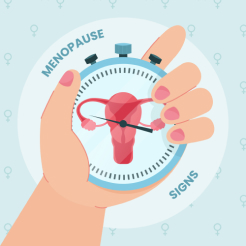Menopause can be associated with changes in weight and body composition for many women. Several factors contribute to weight gain during menopause, including hormonal changes, aging, and lifestyle factors. Here are some key factors:
-
Hormonal Changes:
Estrogen Levels: During menopause, a woman’s body experiences a decline in estrogen levels. Estrogen plays a role in regulating metabolism and body fat distribution. The decrease in estrogen can lead to a shift in fat storage, often favoring the abdominal area.
Insulin Sensitivity: Hormonal changes can also affect insulin sensitivity, potentially leading to weight gain, especially around the midsection. - Metabolism and Aging: As women age, there is a natural decline in metabolic rate, which can result in the accumulation of body fat if dietary and activity levels remain constant.
-
Lifestyle Factors:
- Physical Activity: Many women may become less active during menopause due to factors such as busy schedules, changes in energy levels, or joint discomfort. A sedentary lifestyle can contribute to weight gain.
Dietary Habits: Changes in eating habits, such as increased cravings for high-calorie foods or emotional eating, can also contribute to weight gain during menopause. - Muscle Mass Loss: With aging and hormonal changes, there is a tendency to lose muscle mass. Since muscle tissue burns more calories at rest than fat tissue, a decrease in muscle mass can lead to a reduction in overall calorie expenditure.
- Genetics: Genetic factors can influence an individual’s predisposition to weight gain. If there is a family history of weight gain during menopause, it may increase the likelihood of experiencing similar changes.
Tips for Managing Weight During Menopause:
- Regular Exercise: Engage in both cardiovascular exercises (e.g., walking, jogging) and strength training to maintain muscle mass and boost metabolism.
- Healthy Eating: Focus on a balanced diet rich in fruits, vegetables, whole grains, and lean proteins. Be mindful of portion sizes.
- Stay Hydrated: Drinking an adequate amount of water can help with weight management and overall health.
- Manage Stress: Practice stress-reducing activities such as meditation, yoga, or deep breathing to help minimize emotional eating.
- Consult a Healthcare Professional: If experiencing significant weight changes or if concerned about overall health during menopause, consult with a healthcare professional who can provide personalized advice and guidance.
It’s important to note that individual experiences vary, and not all women will experience significant weight gain during menopause. Lifestyle choices play a crucial role in managing weight and overall well-being during this life stage.








